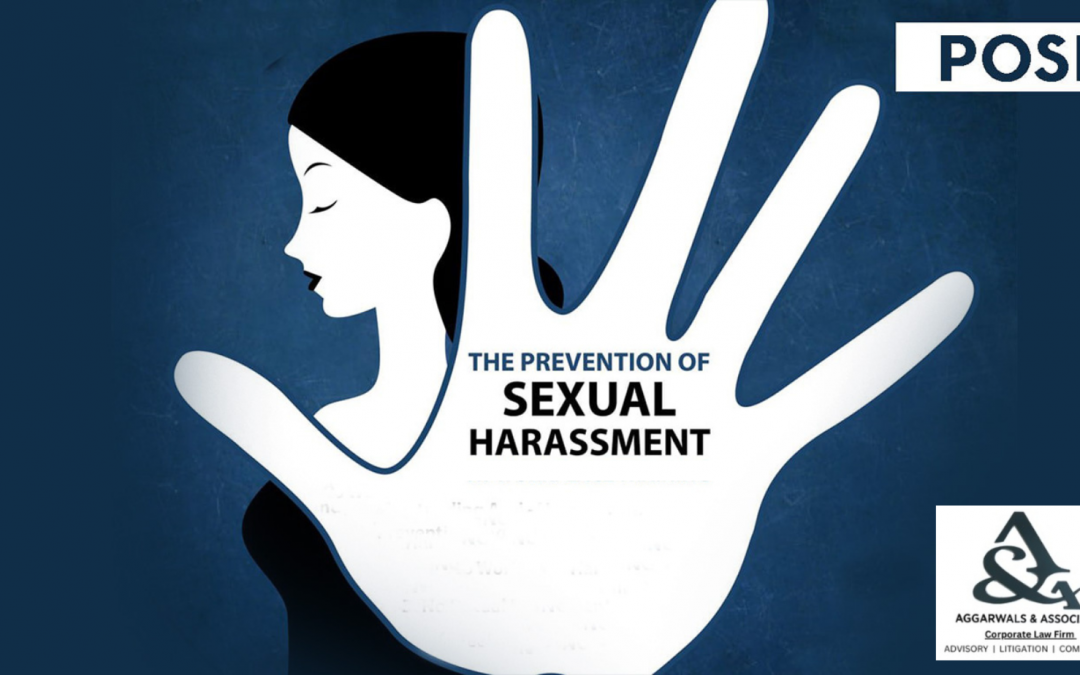
by Aggarwals Associates | Jan 30, 2023 | Criminal Lawyers, General
The definition of sexual harassment is well-defined in the POSH Act, It states that “sexual harassment is any unwelcome sexual behavior, whether directly expressed or implied, and includes the case of physical contacts and advances, or sexual favour demanded or requested, or making remarks with sexual overtones, or showing pornography or other offensive material, or acting in an unwelcome sexual manner through physical, verbal, or non-verbal means.
What are the different provisions under PoSh Act?
Conciliation: Conciliation plays an important role in dispute resolution as it is always gives win- win solutions to the parties. It is an effective form of ADR ( Alternative Dispute Resolution) mechanism in which a third party, conciliator helps in resolving the dispute by giving multiple solutions to both of the parties. The matter related to the POSH can be resolved by the method of conciliation but it cannot be resolved on monetary terms.
Interim Relief: The victim can get one of the following interim reliefs in the POSH Act:
Relocation for any of them.
There is a provision of 3 months’ leave for the aggrieved women.
Confidentiality Report
Punishment for false complaint:
The Act consists of provisions for the false complaint to prevent bogus allegations and to protect the interest of employees. The provisions of false complaints are very essential to protect the innocents. The person filing false complaint will be entitled to one of the following punishments:
A written apology letter by the complainant.
The promotion of such a person can be withheld by the company.
The pay rise or increment can be withheld by the company.
Termination of services, etc.
View of Legislation on false complaint related to sexual harrasment at work place
The High Court of Delhi imposed a hefty fine of Rs. 50000 on the petitioner
for filing a false case against the respondent in the case named Anita Suresh
vs Union of India & Others, P (C) 5114/2015. This clearly states that the
legislation is strict for false and misleading complaints.
The legal procedure to file a complaint of sexual harassment?
The victim can complain to the internal committee in the company and then to the complaint committee. Also, the aggrieved person can claim under various other provisions provided under Indian legislation such as sec 354 of IPC (Indian Penal Code)
It is pertinent to mention here that the time period for filing a complaint is three months but can be further extended to three months depending on circumstances. Moreover, if the victim herself is not able to complain she can complain through the appropriate person as provided under the legislation.
What are the different loopholes in the POSH Act?
Gender Biased: The provisions stated in the Act is specifically for female employee that depicts that only women are subjected to sexual harassment. This is the major drawback of the legislation that it is gender biased.
No protection for the informal sector: The legislation does not have specific provisions for the informal sector, this shows that the legislation is biased toward the informal sector as the complaint by this sector is not taken into consideration.
The legislation deals with all the basic provisions such as definition, punishment, and appropriate channels to complain. Also the Acts contains provisions for false complaints that is utmost necessary in this legislation. Every employer should add the provisions for sexual harrasment to ensure healthy environment at work place in their employee manual and also to take initiative for arranging awareness campaign at fixed intervals of time.
Surbhi Singla
Associate at Aggarwals & Associates, S.A.S Nagar, Mohali

by Aggarwals Associates | Jan 24, 2023 | Criminal Lawyers, General, Labour Law Lawyers, MSME, Parliament
The Sexual Harassment of Women at Workplace (Prevention, Prohibition, and Redressal) Act, 2013(herein after referred as PoSH Act) is the first and the only legislation in Indian laws that deal specifically with sexual harassment of Women at the workplace. Though, India has several criminal and civil provisions that are related to sexual harassment and also have prescribed punishment for the same under section 354 of the Indian Penal Code (hereinafter referred to as IPC) which speaks about outraging the modesty of a woman. The defined punishment of which is 1 year of imprisonment or fine or can be both depends on the discretion of the court.
What is Sexual harassment?
The definition of sexual harassment is well-defined in the POSH Act, It states that “sexual harassment is any unwelcome sexual behaviour, whether directly expressed or implied, and includes the case of physical contacts and advances, or sexual favour demanded or requested, or making remarks with sexual overtones, or showing pornography or other offensive material, or acting in an unwelcome sexual manner through physical, verbal, or non-verbal means.
Who is Employee under the PoSH Act?
Section 2(f) “employee” defines any person employed at a workplace on a regular, transitory, ad – hoc basis, or daily salary basis, whether directly or via an agency, including a contractor, for any task, with or without the knowledge of the principal employer, whether for remuneration or not, or working voluntarily or otherwise, whether the terms of employment are express or implied, and entails a co-worker, probationer, a contract worker, trainee.
What are the different objectives of the PoSH Act?
PoSH is an act to protect, prevent and prohibit sexual harassment of women at workplace. The main objective of the PoSH Act is to provide a safe and healthy workplace to each and every employee of any organisation. In addition to this it is essential to give a dignified life to all their female employee. The sexual harassment not only means physical torture but it also includes passing sexual comments, bullying, body shaming, taunting and other minor things by the colleagues and higher authorities.
What are the two main committees constituted under PoSH Act?
The two main committees constituted under PoSH Act for preventing the sexual harassment at work place: Internal and Local Committees.
Internal Committee: It is mandatory for every organisation to set up an internal committee if the company is equipped with more than 10 or more employees. The committee is to be formed under the provisions of the PoSH Act and the quorum of members is to be decided according to the provisions of the legislation. The non-compliance of which will attract a fine of Rs.50,000.
Local committee: A local committee is established in each district for dealing with the matter of sexual harassment in the workplace. Before registering the complaint in the local committee, one should go to the internal committee. The committee is established under Section 5 of the PoSH Act by repealing &the Amendment Act of 2016.
Powers of the committee: With the introduction of two different committees, powers are also specified in the Act. The committee can
- Summon and interrogate the accused person under the oath.
- Can ask for the discovery of documents.
- Any other things that are essential for the case.
The legislation deals with all the basic provisions such as definition, punishment, and appropriate channels to complain for any sort of physical and mental harassment faced by any women at their workplaces and it also assures that the women stays safe.
–Surbhi Singla
Associate at Aggarwals& Associates, S.A.S, Nagar Mohali.

by Aggarwals Associates | Jan 18, 2023 | General
Immigration and human rights are closely related, as the human rights of immigrants and refugees are often at risk during the immigration process. The Universal Declaration of Human Rights, adopted by the United Nations in 1948, guarantees the right to leave any country and the right to seek asylum in other countries. However, in practice, many countries have immigration policies and practices that violate these rights. This can include the detention of immigrants and refugees in inhumane conditions, denial of due process, and discrimination based on race, religion, or national origin. It is important for governments to ensure that their immigration policies and practices comply with international human rights standards and to protect the human rights of all individuals, including immigrants and refugees.
Constitutional provisions for immigrants in India.The Constitution of India does not have specific provisions regarding immigration. However, it does contain several provisions that are relevant to the rights of immigrants and their treatment in India.
Article 14 of the Constitution guarantees the right to equality before the law and prohibits discrimination on the grounds of religion, race, caste, sex, or place of birth. This applies to immigrants as well as Indian citizens.
Article 21 guarantees the right to life and personal liberty, which includes protection against arbitrary arrest and detention. This applies to immigrants as well as Indian citizens, and would require that any detention of immigrants be in accordance with due process of law.
Article 23 prohibits forced labour, which would prohibit the use of immigrants as forced labour.
Article 24 prohibits the employment of children below the age of 14 years in any factory, mine or other hazardous employment.
Article 39(e) & (f) directs the state to make provisions for securing just and humane conditions of work and for maternity relief.
And also, India is also a signatory to several international human rights treaties, such as the International Covenant on Civil and Political Rights and the Convention on the Rights of the Child, which contain provisions that are relevant to the rights of immigrants and refugees.
Remedies for issues in case of violation of Human rights in India
If an immigrant in India believes that their human rights have been violated, they may have several avenues for seeking remedies. Some possible remedies include:
Complaint to the police: If the violation is a criminal matter, such as physical assault or theft, the immigrant can file a complaint with the police.
Complaint to the National Human Rights Commission (NHRC): The NHRC is an independent body established by the Indian government to investigate human rights violations. Immigrants can file a complaint with the NHRC if they believe that their rights have been violated by government officials or agencies.
Legal action: If the violation is a civil matter, such as employment discrimination or denial of housing, the immigrant can take legal action in a civil court.
International remedies: If the immigrant is a refugee or asylum seeker, they may be able to seek remedies through international organizations such as the United Nations High Commissioner for Refugees (UNHCR).
Complaint to the office of State Human Rights Commission(SHRC): Each state in India have their own SHRCs to investigate human rights violation by a government official or non-government actors within the state.
They can also seek help from non-government organizations that work on immigrant rights and provide legal assistance.
-Surbhi Singla
Associate at Aggarwals & Associates, S.A.S Nagar Mohali.

by Aggarwals Associates | Jan 6, 2023 | General, MSME
What are the benefits of registering a company under MSME?
There are multiple advantages of registering the company under MSME some of the common benefits are mentioned below:
Protection against delayed payment: The ministry provides that the buyer has to pay the billed amount within 15 days after receiving the product or service in case the payment is not decided. In addition, the owner of MSME can charge interest on the delayed payment if the payment is delayed by 45 days.
Rebate in Tax: The companies registered under MSME are having multiple benefits in terms of payment. Additionally, the companies are excluded from the audit and inspection.
Discount in patent filing: The ministry of MSME gives a 50% of instant discount at the time of patent filing to promote small-scale industries.
Easy Bank loans are collateral-free and have less interest rate: The companies registered under MSME get collateral-free loans from the bank and also the interest rate on bank loans is very less as compared to other companies.
Worldwide business exposure: The ministry provides every opportunity for the MSME enterprises to connect globally and makes space in the international market. The exhibition, seminars, and all international events can be accessed by the companies registered under the Ministry of MSME.
Discounts on Electricity Bills: The companies registered under MSME are eligible to avail reimbursement for the electricity bill.
No fees for ISO certificate: If the company submits the application for an ISO certificate with the registration certificate of MSME, the certificate will be issued free of cost after fulfilling all the essential conditions.
Reimbursement for technology upgradation: The cost incurred on the installation of clean technology and the audit cost and other expenses will be reimbursed by the Government in order to keep the companies updated on the latest technology.
There are some basic questions that create confusion in the mind of people. Here is answer to all their queries.
Whether the start-up companies are eligible for registration under MSME?
Yes, start-up companies can register themselves under MSME using the UAM (Udyog Aadhar Memorandum) portal.
Whether Pharma Companies are eligible for registration under MSME?
Yes, Pharma companies can register themselves under MSME by following the online registration procedure.
What are the documents that are required for registration purposes?
For registering under MSME one must have a valid Aadhar Card, Pan Card, and GST details are the basic document requirement.
Is it compulsory to obtain GST for registration under MSME?
Yes, GST registration is mandatory for the registration of companies under MSME.
How much cost is required for registering under MSME?
The registration process under MSME is free of cost.
What is the procedure to register under MSME?
The entire procedure of registration is online. One can register himself by submitting basic information and documents on the online portal.
In order to promote micro, small and medium enterprises the Government of India is giving numerous benefits to these companies. Also, the registration of companies under the ministry of micro, small and medium company is free of cost.
Surbhi Singla
Associate at Aggarwals & Associates, S.A.S Nagar, Mohali

by Aggarwals Associates | Jan 4, 2023 | General, MSME
The Government of India is encouraging start-ups and small businesses. In pursuance of this, it has established the Ministry of MSME (Micro, Small & Medium Enterprises). This ministry is regulated by NSIC (National Small Industries Corporation Ltd). The companies can register themselves under the MSME ministry if they fall under the eligibility criteria of same.
What is MSME?
Before going further, one has to study the definitions of Micro Small and Medium Enterprises.
Micro Enterprises: The companies whose investment in plants and machinery is upto one (1) crore and the total turnover does not exceed five (5) crore falls under the category of micro enterprise.
Small Enterprises: Those companies whose investment in plant and machinery is upto ten (10) and the total turnover does not exceed fifty (50) crores fall under the category of small enterprises.
Medium Enterprises: The companies whose investment in plant and machinery is upto fifty (50) crores and the total turnover does not exceed two hundred and fifty (250) crores fall under the category of medium enterprises.
What are the important changes that came after the amendment in 2020?
With the amendment in MSME criteria following things are also changed with respect to MSME:
- Retail and Wholesale businesses are now included in MSME.
- The limit of investment and turnover is increased as mentioned above.Now, the export turnover is not added to the total turnover.
- Now, the depreciation cost is calculated as per the IT (Information Technology) Rules instead or Commercial rates,
- Now, the threshold limits are the same for the manufacturing and service sector as the different limits for the different sector is creating confusion in the mind of people.
What are the different opportunities provided by MSME?
- The MSME provides employment opportunities to workers and unemployed people.
- The MSME provides growth opportunities to small scale businessmen who are not able to grow due to lack of money.
- The MSME provides development opportunities to skilled labours by providing training at regular intervals.
- The MSME provides opportunities to grow in the international market by providing the basic framework and access to international programmes and seminars.
Why MSME is important for the Indian economy?
- MSME contributes in the growth of rural development as it provides employment opportunities in rural areas.
- With the introduction of MSME the export rate of India is increased than before.
- Highest contributors to GDP after agriculture.
- MSME promotes innovations by bringing new ideas into the market which eventually leads to increased competition in the market.
With the growth of MSME, India is moving towards a developed country as MSME is creating employment opportunities and the technology upgradation that eventually supports the national economy and acts as defence from global economic threats.
..Surbhi Singla
Associate at Aggarwals& Associates, S.A.S Nagar, Mohali







Recent Comments